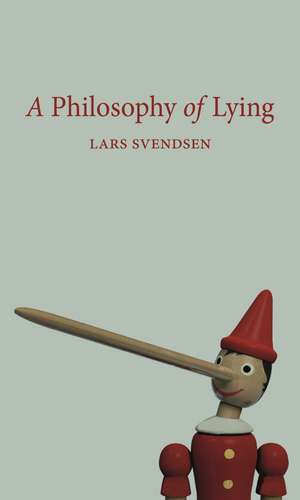A Philosophy of Lying
Autor Lars Svendsen Traducere de Matt Bagguleyen Limba Engleză Paperback – 22 apr 2022
From popular philosopher Lars Svendsen, this book is a comprehensive investigation of lying in everyday life. What exactly is a lie, Svendsen asks, and how does lying differ from related phenomena, such as “bullshit” or being truthful? Svendsen also investigates the ethics of lying—why is lying almost always morally wrong, and why is lying to one’s friends especially bad? The book concludes by looking at lying in politics, from Plato’s theory of the “noble lie” to the Big Lie of Donald Trump.
As phrases like “fake news” and “alternative facts” permeate our feeds, Svendsen’s conclusion is perhaps a surprising one: that, even though we all occasionally lie, we are for the most part trustworthy. Trusting others makes one vulnerable, and we will all be duped from time to time. But all things considered, Svendsen contends, truthfulness and vulnerability are preferable to living in a constant state of distrust.
Preț: 89.85 lei
Nou
Puncte Express: 135
Preț estimativ în valută:
17.20€ • 17.72$ • 14.52£
17.20€ • 17.72$ • 14.52£
Carte disponibilă
Livrare economică 10-17 februarie
Livrare express 25-31 ianuarie pentru 16.20 lei
Preluare comenzi: 021 569.72.76
Specificații
ISBN-13: 9781789145632
ISBN-10: 1789145635
Pagini: 136
Dimensiuni: 121 x 197 x 15 mm
Greutate: 0.09 kg
Editura: REAKTION BOOKS
Colecția Reaktion Books
ISBN-10: 1789145635
Pagini: 136
Dimensiuni: 121 x 197 x 15 mm
Greutate: 0.09 kg
Editura: REAKTION BOOKS
Colecția Reaktion Books
Notă biografică
Lars Svendsen is professor in the Department of Philosophy at the University of Bergen, Norway. He is the author of many books for Reaktion Books, including A Philosophy of Boredom and A Philosophy of Loneliness. Matt Bagguley is a translator of Norwegian fiction and nonfiction. He lives in Oslo.
Recenzii
"'It is better to be fooled occasionally than to go through life with . . . chronic distrust,' writes philosopher Svendsen in this clever take on lying and telling the truth. . . . And though people can be dishonest, Svendsen remains hopeful that serial lying is an anomaly. His reflections are nuanced, his conclusions smart, and he keeps things free of academic jargon. Philosophy-minded readers will find this an enjoyable and enlightening study."
"Svendsen writes for a popular audience, offering an engaging introduction to philosophical thought on the nature and ethics of lying. . . . Svendsen’s examples are vivid and his writing is both animated and accessible—a credit to the translator, Matt Bagguley, as well. Some of the analysis is quite contentious, and readers may find that their intuitions about cases do not align with those of the author, but working out why is part of the fun of engaging with work in practical ethics such as this. We come to moral philosophy for guidance, but also, perhaps, stimulation: an opportunity for thought and friction."
"Whether and under what circumstances lying is permissible has long been a litmus test for evaluating normative ethical theories. To that end, the history of philosophy
—from Plato to Augustine to Kant to Bernard Williams and beyond—is replete with discussions of lying and deception. In this brief survey of the topic, Svendsen (Univ. of Bergen, Norway) distills major theories about lying into a sort of guide to
understanding lying and deception in everyday life."
—from Plato to Augustine to Kant to Bernard Williams and beyond—is replete with discussions of lying and deception. In this brief survey of the topic, Svendsen (Univ. of Bergen, Norway) distills major theories about lying into a sort of guide to
understanding lying and deception in everyday life."
"What are we to do if we confront lying honestly? . . . Svendsen gives us ready access to the thought of the best and brightest in the philosophical tradition, and he does so with wit, charm, and clarity. But he gives us more than that. He offers considerate advice on questions of utmost importance to living well in a world where lying is a fact."
